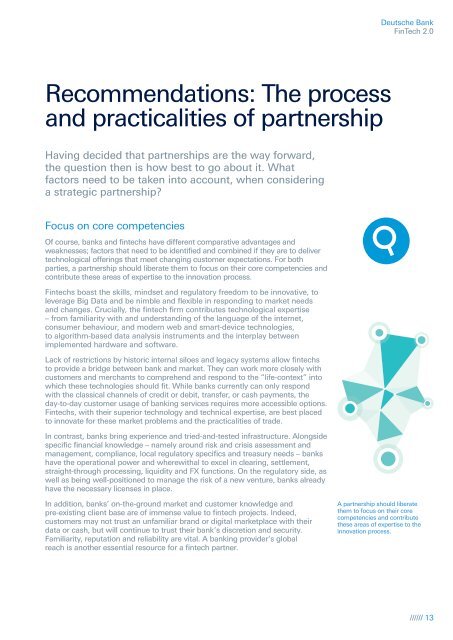FinTech 2.0
YKHHI
YKHHI
Create successful ePaper yourself
Turn your PDF publications into a flip-book with our unique Google optimized e-Paper software.
Deutsche Bank<br />
<strong>FinTech</strong> <strong>2.0</strong><br />
Recommendations: The process<br />
and practicalities of partnership<br />
Having decided that partnerships are the way forward,<br />
the question then is how best to go about it. What<br />
factors need to be taken into account, when considering<br />
a strategic partnership?<br />
Focus on core competencies<br />
Of course, banks and fintechs have different comparative advantages and<br />
weaknesses; factors that need to be identified and combined if they are to deliver<br />
technological offerings that meet changing customer expectations. For both<br />
parties, a partnership should liberate them to focus on their core competencies and<br />
contribute these areas of expertise to the innovation process.<br />
Fintechs boast the skills, mindset and regulatory freedom to be innovative, to<br />
leverage Big Data and be nimble and flexible in responding to market needs<br />
and changes. Crucially, the fintech firm contributes technological expertise<br />
– from familiarity with and understanding of the language of the internet,<br />
consumer behaviour, and modern web and smart-device technologies,<br />
to algorithm-based data analysis instruments and the interplay between<br />
implemented hardware and software.<br />
Lack of restrictions by historic internal siloes and legacy systems allow fintechs<br />
to provide a bridge between bank and market. They can work more closely with<br />
customers and merchants to comprehend and respond to the “life-context” into<br />
which these technologies should fit. While banks currently can only respond<br />
with the classical channels of credit or debit, transfer, or cash payments, the<br />
day-to-day customer usage of banking services requires more accessible options.<br />
Fintechs, with their superior technology and technical expertise, are best placed<br />
to innovate for these market problems and the practicalities of trade.<br />
In contrast, banks bring experience and tried-and-tested infrastructure. Alongside<br />
specific financial knowledge – namely around risk and crisis assessment and<br />
management, compliance, local regulatory specifics and treasury needs – banks<br />
have the operational power and wherewithal to excel in clearing, settlement,<br />
straight-through processing, liquidity and FX functions. On the regulatory side, as<br />
well as being well-positioned to manage the risk of a new venture, banks already<br />
have the necessary licenses in place.<br />
In addition, banks’ on-the-ground market and customer knowledge and<br />
pre-existing client base are of immense value to fintech projects. Indeed,<br />
customers may not trust an unfamiliar brand or digital marketplace with their<br />
data or cash, but will continue to trust their bank’s discretion and security.<br />
Familiarity, reputation and reliability are vital. A banking provider’s global<br />
reach is another essential resource for a fintech partner.<br />
A partnership should liberate<br />
them to focus on their core<br />
competencies and contribute<br />
these areas of expertise to the<br />
innovation process.<br />
////// 13


